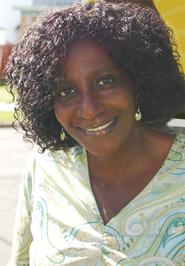
Dietra Harvey grew up in a household where critical citizenship and voting were basic tenets of family life. Today, in the same way she was brought into the voting booth as a young girl by her parents, Harvey carries on the tradition by bringing her own children to the polls every November.
At a lecture titled “More than just some Facebook posts: voting as an act of critical citizenship,” Harvey built upon the these childhood values to explain how essential it is that citizens recognize the importance of engaging face to face with one another to build community and the need to civically engage through voting and public dialogue in order to counter the shortcomings of communication in the digital age.
According to Harvey, taking “active steps” in becoming part of a community is how problems are addressed and solutions are found. As president of the local NAACP chapter in Utica, she has experienced first hand the effectiveness of building up a tangible sense of community by bringing people together. As she readily admitted, entering a room of strangers is uncomfortable as is standing a close distance to someone unknown.
However, it is in these moments of temporary discomfort that doors are opened for moving a community forward. “In these situations,” Harvey said, “you may not have a lot in common with others, but you do share two things: you are human, and you care. Engaging is uncomfortable at first, but at the end of the day, we need each other. Everyone has a piece of the puzzle and when no one shows up to put the pieces together, the jigsaw cannot be fully assembled.”
Countering efforts to connect on a human level, according to Harvey, is the pervasive nature of social media in the digital age. Too many of us have checked out of the political process and those who remain tend to lose their real identity as they hide behind blogs, twitter or Facebook. Social media may be beneficial in expediting communication, but in convenience, we focus too much on speed and results and the result is anonymity. In Harvey’s opinion, among its many benefits, the disadvantage of technology is the loss of human interaction.
To those attending Harvey’s lecture, one question was clear: what can we do to counteract the dangers she spoke about? One way is to find a method to break through the barriers of discomfort. Take time to put aside your work and just talk to others in your community. Spending 30 seconds in casual conversations sets the stage for later work in a way that a Facebook message or tweet just can’t match. Harvey believes that even the smallest steps toward this goal will help. Everyone can serve somewhere, everyone can do something. Voting, at a simple level, is the minimum commitment to one’s community. The hope of this lecture is that voting then builds into something more.
The lecture was co-sponsored by the Days-Massolo Center, the Hamilton Democrats and the Hamilton Republicans.
